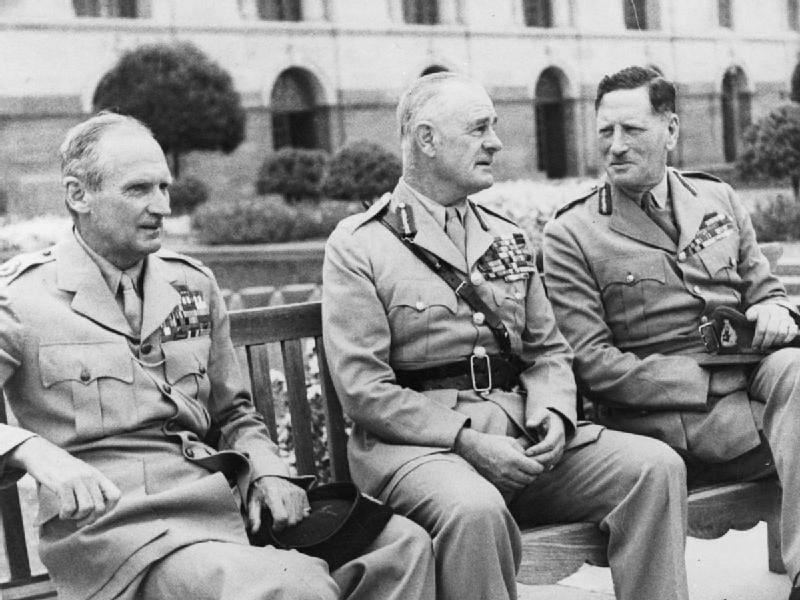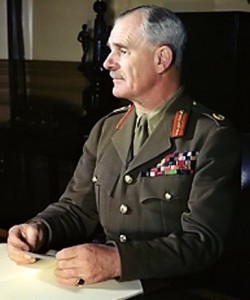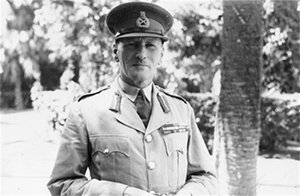
Generals Wavell and Auchinleck, and the Lost Art of Going Quietly
Originally published in 2012 as “Churchill, Obama and the Sacking of Generals.” The relieving of General Stanley McChrystal, then news, has since lapsed into obscurity, so the piece is republished without those comparisons.
Churchill on sacking generals
“It is difficult to remove a bad General at the height of a campaign; it is atrocious to remove a good General.” —WSC, 6 November 1942
A reader asked how Churchill’s firing of two popular generals in 1941-42 compared to the sacking of Douglas MacArthur, the Korean War commander, by President Truman in 1951. There is no comparison.
Churchill’s generals, Archibald Wavell and Claude Auchinleck, were removed in the hope of more vigorous operations against Irwin Rommel’s Afrika Korps. Moreover, the British generals continued their careers and honorable service. MacArthur was relieved for insubordination to the civilian authority. Though briefly mooted as a presidential candidate, he never served again. “They started raising money to buy him a Cadillac,” Harry Truman cracked. “He never got that car.” (MacArthur might have replied as did Mrs. Robert Taft, who said, “I’m just mild about Harry.”)
Archibald Wavell

General Wavell (1883-1950) was relieved of the British Middle East Command on 21 June 1941. In effect, he changed places with General Claude Auchinleck, becoming Commander-in-Chief India and, two years later, India’s Viceroy.
Churchill wrote that Wavell “received the decision with poise and dignity…. On reading my message he said, ‘The Prime Minister is quite right. There ought to be a new eye and a new hand in this theatre.’ In regard to the new command he placed himself entirely at the disposal of His Majesty’s Government.” [1] Earlier, Churchill had expressed an opinion of Wavell that never wavered: “A master of war, sage, painstaking, daring and tireless.” [2]
Wavell remained in the Army until 1943, when he became Viceroy of India. His first and most important action was to take steps to relieve the Bengal Famine. There he served until 1947.
Claude Auchinleck

General Auchinleck, known as “The Auk” (1884-1981), lost his Middle East Command on 8 August 1942. Churchill offered him the Iraq and Persia Command. Auchinleck declined, believing it was wrong to separate those from the Middle East. He returned to India, and when Wavell became Viceroy he reassumed command of the Indian Army. He retired in 1947 after forty-three years of distinguished service.
The Auk had won the First Battle of Alamein in July 1942. His plans to finish Rommel were in place when he was relieved. Nevertheless, Churchill wrote, he “received the stroke with soldierly dignity.” [3]
“It was a terrible thing to have to do,” WSC added later. “He took it like a gentleman. But it was a terrible thing. It is difficult to remove a bad General at the height of a campaign; it is atrocious to remove a good General. We must use Auchinleck again. We cannot afford to lose such a man from the fighting line.” [4] Churchill—safe in his own skin and utterly disdaining opinion polls—could confidently say such a thing.
The lost art of leaving quietly
The two relieved generals placed themselves at the government’s disposal. They left their commands professing esteem for their civilian chiefs, and vice-versa. They retired years later after illustrious careers.
Leaving quietly was what you did in those bygone days. Lord Halifax in 1940 proposed negotiations with Hitler; rejected by the War Cabinet, he did not offer interviews to air his grievances. Nor would such an act of public disloyalty have occurred to him. George Marshall, a great man, had many disagreements with his civilian chiefs. Offered a million dollars for his memoirs, he declined, saying, “I have already been adequately compensated for my services.”
Endnotes
[1] Winston S. Churchill, The Grand Alliance (London: Cassell, 1950), 310.
[2] Robert Rhodes James, ed., Winston S. Churchill: His Complete Speeches 1897-1963, 8 vols. (New York: Bowker, 1974) VI: 6346.
[3] Winston S. Churchill, The Hinge of Fate (London: Cassell, 1951), 422.
[4] Harold Nicolson Diary, 6 November 1942, in Nigel Nicolson, ed., Harold Nicolson: Diaries and Letters, vol. II 1945-67 (London: Collins, 1967), 259.
[5] World Association of International Studies, 24 June 2010.
Further reading
“On Good News from Generals: Churchill’s Experience and Methods,” 2021.
“Winston Churchill’s Three Best War Books,” 2020.
Raymond Callahan, “Great Contemporaries: Wavell, Man of Silences,” 2021.
Raymond Callahan, “Great Contemporaries: Auchinleck, Soldier of the Raj,” 2021.






